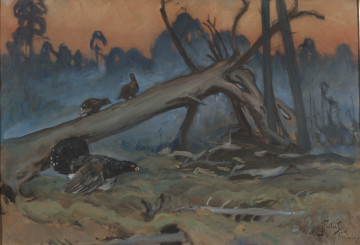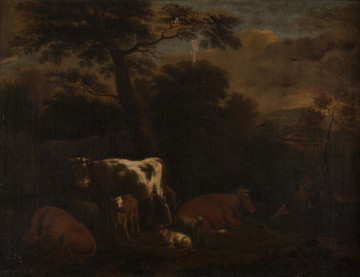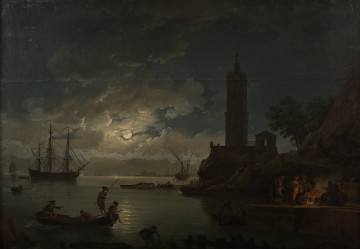
Capercaillie turning
20th century
Castle Museum in Łańcut
Part of the collection: Malarstwo i rysunek
This is one of four paintings by Julian Fałat in our collection, which were the property of the Potocki family, the owners of the castle. Bystra Śląska is a town located near Beskid Śląski, in Teschen Silesia, and is the location of the villa that was the property of Julian Fałat and his family since 1910, and where the artist died on 10 July 1929. Currently the villa houses a museum (a branch of the Regional Museum in Bielsko-Biała) dedicated to the life and work of the painter (early oil paintings and first watercolours on the ground floor, paintings with hunting themes and landscapes on the upper level). Julian Fałat (born 1853 in Tuligłowy, died 1929 in Bystra) is one of the most prominent Polish watercolour painters, a representative of Polish impressionism and realism. He studied at the School of Fine Arts in Krakow, then in Zurich and Munich. He completed his studies in 1880, and in the meantime painted landscapes, portraits and genre scenes. For a short time, he painted using oils, but he abandoned the medium quite quickly in favour of watercolours for a very prosaic reason – watercolour paints were much less expensive – and achieved mastery in this technique. In 1884, he travelled to Spain, where he spent a year, and then set off on a trip around the world. In 1895, he became the director of the School of Fine Arts in Krakow, where he gained renown for carrying out a teaching reform. He later became its rector. He showed his paintings in Berlin and Chicago, and received a gold medal in Vienna for his painting Return from the Hunt. After moving to Bystra, his work became dominated by landscapes, especially snowy scenes, the subject of which were the Beskid Mountains and the area of Bystra. The Łańcut painting presents just such an early spring landscape, with masterfully depicted partially melted snow, revealing nature awakening to life.
Author / creator
Object type
Painting and drawing
Technique
tempera
Material
wood, glass, cardboard
Origin / acquisition method
decyzja administracyjna
Creation time / dating
Creation / finding place
Owner
Castle Museum in Łańcut
Identification number
Location / status

20th century
Castle Museum in Łańcut

2nd quarter of the 17th century
Castle Museum in Łańcut

18th century
Castle Museum in Łańcut
DISCOVER this TOPIC
Museum of King Jan III's Palace at Wilanów
DISCOVER this PATH
Educational path